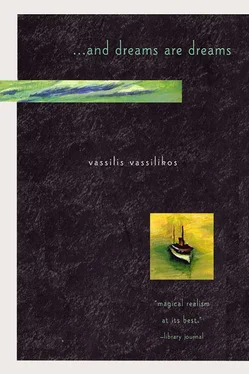‘“Admiral,’ replied Capodistrias, ‘I did not come to Greece to end up the laughing stock of Europe. I will continue to shave in front of the infant in order for it to learn how to use a razor safely.’
“Capodistrias wasn’t especially liked by his host, Kontostavlos. His friend Korais had written to Kontostavlos that he found the governor very haughty.
Korais was not wrong. But that year was a particularly important one for the land. (‘Although, of course, which year wasn’t important for this land?’ the captain thought to himself. ‘Every year was as important as a day in the life of a dying man, because this infant was born half dead, and for the past 180 years everybody has been trying to bring it to life. But let’s just say that that year, 1829, counted more than the others.’)
“It was the year during which the borders of the new Greece were being widely discussed. The French insisted that if ‘ it were limited to the Peloponnese, it would be too weak to defend itself .’ The Russians ‘ are in favor of imposing a solution, even if it is done by them unilaterally ,’ and, having guaranteed the neutrality of Austria, they started the Russo-Turkish War to help Greece grow larger. But the English did not agree. They were afraid that if Greece grew larger, it would pass under the influence of the Russians, and then the English would lose their domination of the Ionian Islands. (One hundred ten years later, Churchill, fearing that Greece would be taken over by the Soviet Union, provoked the repression of December 1944.)
‘Thank God,’ cried Wellington in London. ‘ It (the liberation of Greece) had never cost a shilling and never shall. ’ Besides, his orders the previous year (on October 21, 1828), to his envoy in Nafplion had been clear: ‘ On the subject of Greece, I would limit its borders to the Peloponnese if possible, and if not, as close to the Isthmus of Corinth as possible .’
“It was in such an atmosphere that the
Kontostavlos’s reception was held, and the host was circumspect in his actions.”
The captain was lost in thought again. The figure of the governor had caused him problems since his great-grandfather went into a depression because among the iron laws imposed by N’estce pas was one banning piracy. The captain’s grandfather used to tell him pirate stories when he was the same age as his youngest grandchild was now, and he still remembered them. Because Capodistrias had his good points, but he was also a perverse man. “ Until I came along, these Greeks didn’t even know how to make a salad ,” he said, showing by “these Greeks” how alienated he really was. He was accountable to a Europe that the Greeks did not know; he wanted to cure “ the illness Greece had suffered from, after four centuries of slavery and seven of anarchy ,” the same way dictators play doctor by putting a country in plaster. He wanted to make Greece into another Switzerland, but he was forgetting that the Greeks had as a model not William Tell, but Dighenis Akritas.
“So back then Greece only went as far as the souvlaki shops at Corinth Canal, Grandfather?”
“That’s as far as it went, my boy. They could smell the burning scent of freedom from across the way and it made their heads swim.”
“So how come it grew?”
The grandson was waiting for the rest of the story.
But his grandfather remained silent. He was dreaming of his life. Oh, if only he could rewrite it!
“And what happened to Capodistrias,
Grandfather?”
“They killed him, my boy, one day when he was on his way to church.”
“Why did they kill him, Grandfather?”
“Because people are evil, my boy.”
The grandson was waiting. He would go and
watch the Smurfs video again if his grandfather didn’t go on with the story. But his grandfather seemed distracted. There was something else on his mind.
“I’ve kept the double-barreled shotgun for you, my boy.”
The young man did not understand what gun his grandfather was talking about.
“You know, my shotgun….”
“And who am I supposed to kill with it,
Grandfather?”
— 5-
The Narrator, Suite
“Othonos Street, please. The Olympic Airways office.”
“Where’s that?” asked the taxi driver, hastening to add, “I’m new at the job.”
“It’s at Constitution Square,” said the narrator, and right away he was struck by the absurdity of it.
Imagine that: Othonos Street being at Constitution Square. Otto, who never wanted to grant his subjects a constitution, was now condemned by city planning to name one of its four sides. And to be forced to enter Amalias Avenue, when he had never entered his own Amalia. (“ The protocol of the autopsy performed on Queen Amalia attested that she remained a virgin .”) A taste of videotape, sour, misleading, slippery as a banana peel, comes to the narrator’s mind every time he touches upon, even by mistake, a name or an event of that period. Immediately, he thinks of the television miniseries Queen Amalia , starring the Greek Brigitte Bardot; and of Mando Mavrogenous with the Greek Claudia Cardinale: the fake dialogue, the fake period costumes, the fake scenery, the cheapness of it all.
Greek history and the writers of historical novels have financed this miniseries mania, he thinks to himself. At least a novel can be read in the original. But where do you find history? It stays in your imagination, personified by its televisual models: Amalia-Brigitte, Mando-Claudia. While reading of Kontostavlos’s reception earlier, he could not avoid feeling the slimy banana peel, his allergy to videotapes, crawling over his skin.
“Who was Otto, Grandfather?”
“He was our first king, the second son of the philhellene King of Bavaria Ludwig I and Theresa, daughter of the Duke of Saxon Hildburghausen, niece of the Baron Niebelhausen, and great-grandmother of Maunthausen. According to historians, her father, a ladies’ man, had to abdicate the throne in 1848, because of the scandal surrounding his relationship with Lola Montez, although his abdication was probably really due to the popular uprising that year.
“Ever since childhood, Otto had been a bit of a dunce. And he was sickly too, poor boy. At the age of fourteen he was sent to Livorno, in Italy, for treatment of a neurological disorder. He had to return the following year. Nowadays, a child with such reactions would be placed under the observation of neurologists and psychiatrists.”
“So why did they send him to us as a king?”
“Because, my boy, it seems nobody else was available on the market. Or rather there was one, Leopold, who wanted to come, but Capodistrias was quick to discourage him. You see, Capodistrias, who could not foresee his untimely end, did not want to have anyone else over his head. So he made sure, in his own way, by writing Leopold letters in which he spoke of Greece as a banana republic (which it was in a way, but we usually keep information like that to ourselves) so as to dissuade him from coming. And so, Leopold, who later became king of Belgium and proved himself to be a fine man, longed for Greece into his deepest old age, because he had loved it as he had loved Lord Byron. ‘Belgium is only prose writing,’ he wrote in a letter. ‘Greece satisfied the poetic needs of my soul.’ So, our good old mediators sent us Otto.”
But why did we need mediators, Grandfather?”
Because, my boy, we were good Christians. We believed in the Holy Trinity. The Father, the Son, and the Holy Spirit. In those days this meant England, Russia, and France. But before sending us Otto, who was still a kid, they sent us a professor, Friedrich Thiersch, who hellenized his name to Friderikos Thirsios, as was the fashion back then. They sent him on the pretext of an archaeological expedition. Up until World War II the Germans always sent us their agents disguised as archaeologists. Nowadays, the English send them as journalists and the Russians as commercial representatives.
Читать дальше












